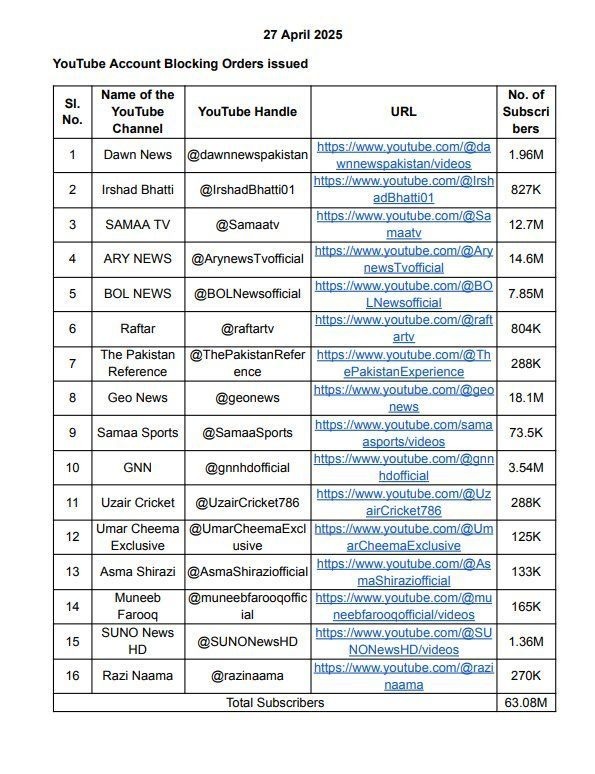India Blocks 16 Pakistani YouTube Channels Over Pahalgam Misinformation
Sixteen Pakistani YouTube channels with a total of 63 million subscribers have been banned
Islamabad-(Mudassar Iqbal)-The Indian government has taken decisive action to restrict several Pakistani YouTube channels for allegedly spreading false propaganda and misinformation following the deadly Pahalgam terror attack. The move is part of India’s efforts to counter online warfare and misinformation campaigns orchestrated by Pakistani intelligence agencies.
According to sources, channels like Geo News, ARY News, BOL News, Dawn News, Samaa TV, Sama Sports, GNN, SUNO TV, RAFTAR, and some individuals including Arshad Bhatti, Asama Sherazi, Muneeb Farooq, Razi Naaama, Umar Cheema, and Uzair Cricket, The Pakistan Reference have been blocked in India for disseminating misleading narratives and dangerous misinformation.

The Indian government has taken a strong stance against these channels, citing their role in spreading provocative content that could lead to problematic situations in the country. The Pahalgam terror attack, which killed 26 tourists and a local, has sparked widespread outrage and condemnation. The Indian government has been working tirelessly to take action against those responsible for the attack and to prevent further incidents.
The decision to block Pakistani YouTube channels is seen as a significant step in this direction. By restricting these channels, the Indian government aims to prevent the spread of misinformation and propaganda that could exacerbate tensions and lead to further violence. The Indian government’s efforts to counter online misinformation campaigns are ongoing, and the government is expected to take further action against anonymous handles and accounts spreading sensitive content that could lead to problematic situations in the country.
The blocking of Pakistani YouTube channels has sparked a heated debate about freedom of speech and the role of social media in spreading misinformation. While some have welcomed the move as a necessary step to prevent the spread of provocative content, others have criticized it as an attempt to suppress dissenting voices.
The Indian government’s action against Pakistani YouTube channels is part of a broader effort to regulate social media and prevent the spread of misinformation. The government has been working with social media companies to remove content that violates their guidelines and to prevent the spread of provocative content. The Pahalgam terror attack has highlighted the need for greater cooperation between governments and social media companies to prevent the spread of misinformation and to counter online warfare.
The Indian government’s efforts to restrict Pakistani YouTube channels are an important step in this direction. By taking action against channels that spread misinformation and propaganda, the government aims to promote a more informed public discourse and prevent the spread of provocative content that could lead to violence.
The implications of the Indian government’s actions are far-reaching. The blocking of Pakistani YouTube channels will likely have a significant impact on the way social media companies operate in India. It may also lead to further restrictions on online content and increased scrutiny of social media platforms.
In conclusion, the Indian government’s decision to block Pakistani YouTube channels for spreading false propaganda and misinformation is a significant step in countering online warfare and preventing the spread of provocative content. The move highlights the need for greater regulation of social media and cooperation between governments and social media companies to prevent the spread of misinformation.
As the situation continues to unfold, it is clear that finding a balance between free speech and regulation will be a major challenge. The Indian government’s efforts to restrict Pakistani YouTube channels serve as a reminder of the importance of responsible social media use and the need for greater cooperation between governments and social media companies to prevent the spread of misinformation and promote a more informed public discourse.
The debate surrounding the blocking of Pakistani YouTube channels raises important questions about the role of social media in shaping public opinion and the need for greater regulation of online content. As governments and social media companies continue to grapple with these issues, it is clear that the future of online discourse in India and beyond will be shaped by the outcome of these efforts.





Comments are closed, but trackbacks and pingbacks are open.